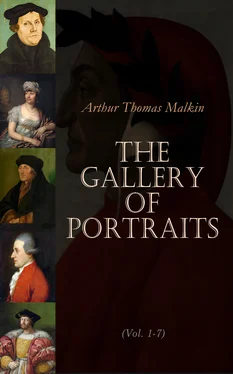It is needless to say that Fenelon submitted. He published without delay the sentence of condemnation, noting the selected propositions, and expressing his entire acquiescence in the judgment pronounced; and prohibited the faithful in his diocese from reading or having in their possession his own work, which up to that moment he had defended so manfully. Protestants, who are too apt in judging the conduct of Roman Catholics, to forget every thing but their zeal, have raised an outcry against his meanness and dissimulation. Fenelon was a sincere member of a Church which claimed infallibility. We may regret the thraldom in which such a mind was held by an authority from which the Protestant happily is free; but the censure which falls on him personally for this act is certainly misplaced.
The faint hopes which his friends might have cherished, that when the storm had passed he would be restored to favour, were soon extinguished by an event, which, whilst it closed against him for ever the doors of the palace, secured him a place in history, and without which it is probable that he would never have become the subject even of a short memoir.
A manuscript which he had intrusted to a servant to copy, was treacherously sold by this man to a printer in Paris, who immediately put it to the press, under the title of Continuation of the Fourth Book of the Odyssey, or Adventures of Telemachus, Son of Ulysses, with the royal privilege, dated April 6, 1699. It was told at court that the forthcoming work was from the pen of the obnoxious archbishop; and before the impression of the first volume was completed, orders were given to suppress it, to punish the printers, and seize the copies already printed. A few however escaped the hands of the police, and were rapidly circulated. One of them, together with a copy of the remaining part of the manuscript, soon after came into the possession of a printer at the Hague, who could publish it without danger.
So eager was the curiosity which the violent proceedings of the French court had excited, that the press could hardly be made, with the utmost exertion, to keep pace with the demand. Such is the history of the first appearance of Telemachus.
Louis was persuaded to think that the whole book was intended to be a satire on him, his court, and government; and the world was persuaded for a time to think the same. So, whilst the wrath of the King was roused to the uttermost, all Europe was sounding forth the praises of Fenelon. The numerous enemies of Louis exulted at the supposed exhibition of his tyranny and profligate life. The philosophers were charmed with the liberal and enlightened views of civil government which they seemed to discover. It is now well known that the anger and the praise were alike undeserved. The book was probably written for the use of the Duke of Burgundy, certainly at a time when Fenelon enjoyed the favour of his sovereign, and was desirous to retain it. He may have forgotten that it was impossible to describe a good and a bad king, a virtuous and a profligate court, without saying much that would bear hard upon Louis and his friends. As for his political enlightenment, it is certain that he had his full share of the monarchical principles of his time and nation. He wished to have good kings, but he made no provision for bad ones. It is difficult to believe that Louis was seriously alarmed at his notions of political economy. That science was not in a very advanced state; but no one could fear that a prince could be induced by the lessons of his tutor to collect all the artificers of luxury in his capital, and drive them in a body into the fields to cultivate potatoes and cabbages, with a belief that he would thus make the country a garden, and the town a seat of the Muses.
Nothing was now left to Fenelon but to devote himself to his episcopal duties, which he seems to have discharged with equal zeal and ability. The course of his domestic life, as described by an eyewitness, was retired, and, to a remarkable degree, uniform. Strangers were courteously and hospitably received; but his society was confined for the most part to the ecclesiastics who resided in his house. Amongst them were some of his own relations, to whom he was tenderly attached, but for whose preferment, it should be noticed, he never manifested an unbecoming eagerness. His only recreation was a solitary walk in the fields, where it was his employment, as he observes to a friend, to converse with his God. If in his rambles he fell in with any of the poorer part of his flock, he would sit with them on the grass, and discourse about their temporal as well as their spiritual concerns; and sometimes he would visit them in their humble sheds, and partake of such refreshment as they offered him.
In the beginning of the 18th century we find him engaged at once in controversy and politics. The revival of the old dispute with the Jansenists, to whom he was strongly opposed, obliged him to take up his pen; but in using it he never forgot his own maxim, that “rigour and severity are not of the spirit of the Gospel.” For a knowledge of his political labours we are indebted to his biographer, the Cardinal de Bausset, who first published his letters to the Duke de Beauvilliers on the subject of the war which followed the grand alliance in the year 1701. In them he not only considers the general questions of the succession to the Spanish monarchy, the objects of the confederated powers, and the measures best calculated to avert or soften their hostility, but even enters into details of military operations, discusses the merits of the various generals, stations the different armies, and sketches a plan of the campaign. Towards the close of the war he communicated to the Duke de Chevreuse heads of a very extensive reform in all the departments of government. This reform did not suppose any fundamental change of the old despotism. It was intended, doubtless, for the consideration of the Duke of Burgundy, to whose succession all France was looking forward with sanguine hopes, founded on the acknowledged excellence of his character, which Fenelon himself had so happily contributed to form. But amongst the other trials which visited his latter days, he was destined to mourn the death of his pupil.
Fenelon did not long survive the general pacification. After a short illness and intense bodily suffering, which he seems to have supported by calling to mind the sufferings of his Saviour, he died February 7th, 1715, in the sixty-fourth year of his age. No money was found in his coffers. The produce of the sale of his furniture, together with the arrears of rent due to him, were appropriated, by his direction, to pious and charitable purposes.
The calumnies with which he was assailed during the affair of Quietism were remembered only to the disadvantage of their authors. The public seem eventually to have regarded him as a man who was persecuted because he refused to be a persecutor; who had maintained, at all hazards, what he believed to be the cause of truth and justice; and had resigned his opinion only at that moment when conscience required the sacrifice.
Universal homage was paid by his contemporaries to his talents and genius. In the grasp and power of his intellect, and in the extent and completeness of his knowledge, none probably would have ventured to compare him with Bossuet; but in fertility and brilliancy of imagination, in a ready and dexterous use of his materials, and in that quality which his countrymen call esprit, he was supposed to have no superior. Bossuet himself said of him “Il brille d’esprit, il est tout esprit, il en a bien plus que moi.”
It is obvious that his great work, the Adventures of Telemachus, was, in the first instance, indebted for some portion of its popularity to circumstances which had no connexion with its merits; but we cannot attribute to the same cause the continued hold which it has maintained on the public favour. Those who are ignorant of the interest which attended its first appearance still feel the charm of that beautiful language which is made the vehicle of the purest morality and the most ennobling sentiments. In the many editions through which it passed, between its first publication and the death of the author, Fenelon took no concern. Publicly he neither avowed nor disavowed the work, though he prepared corrections and additions for future editors. All obstacles to its open circulation were removed by the death of Louis; and in the year 1717, the Marquis de Fenelon, his great-nephew, presented to Louis XV. a new and correct edition, superintended by himself, from which the text of all subsequent editions has been taken.
Читать дальше












